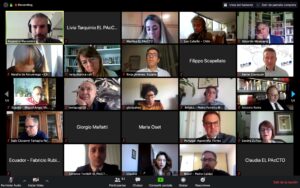COVID19 has once again brought to the table the problem of overcrowding that is resulting in a critical situation at the global level. In some Latin American countries, overpopulation is due to the frequent use of preventive imprisonment by a region’s criminal justice systems.
The prison population awaiting trial accounts for 30 percent of all people in prison in El Salvador and Colombia. But it exceeds 60 percent of the total prison population in Peru and Paraguay, according to data from InSightCrime.
On 5 May, the emergency situation generated by the combination of overcrowding and the COVID-19 health crisis was one of the central points of the communiqué from the United Nations High Commissioner for Human Rights.
Given the urgency of implementing containment measures to prevent the virus entering prison facilities, the EL PAcCTO programme has organised a webinar. More than 80 representatives of the justice and prison systems of 17 EU and Latin America countries debated “the judicial measures taken to reduce overcrowding in the COVID-19 emergency”.
Overcrowding, the effect of criminal policy
The debate was organised around four main blocks:
- regulatory framework
- managing dangerous detainees
- measures taken to reduce overcrowding and avoid possible infections
- management of remand and first-time inmates in the COVID-19 emergency.
Among the main conclusions we can highlight:
- The need for permanent dialogue between the judicial and prison systems in the region;
- Prison overcrowding is an effect of criminal policy that requires reflection on the functioning of the prison system and structured coordination from all the actors in the criminal justice system associated with El PAcCTO;
- The need to reduce the use of pretrial detention;
- The need to increase the use of alternative measures for minor crimes;
- Implementing effective communication strategies to make the public understand that alternative measures are, to all intents and purposes, a form of enforcement.
Alternative measures to prevent overcrowding
Given the many problems posed by overcrowding in prisons, alternative measures are a very favourable option to face the health crisis. This is despite the rejection it can generate within the justice and prison systems themselves, in public opinion and in society as a whole.
“This raises questions about the need to regulate certain alternative measures and their compliance, about their effectiveness and efficiency for the future. In addition to evaluating these measures to see their effect on the forms of behaviour and their impact on crime”, said Lya Cabello, judicial prosecutor with the Chilean Supreme Court and member of the AIAMP.
Mónica Cali, a supervising judge in Turin, Italy, explained that in her country judicial measures were quickly implemented to reduce overcrowding in times of COVID.
People in prison for organised crime have a distinct prison regime in individual cells with very little chance of contact between them. Even so, some took the opportunity to ask for alternative measures. In these cases, the figure of the Supervising Judge, who carefully evaluates the possible risk considering the history of the person in prison, is essential. The history of the criminal organisation from which they come is also taken into account and, at the same time, it is ensured that dignity and rights are respected.
“The path to fairer justice also involves evaluating who goes to prison, those who should and those who must be imprisoned”, as Miguel Ángel Vicente, from the Spanish Ministry of the Interior pointed out.
As for the implementation of alternative measures to prison, “it also requires giving an answer to the question about who goes to prison and establishing the limit to the risk assessment for those who grant alternative measures for the committed act”, as Alejandro Marambio, of the International Red Cross, pointed out, adding that “the logical thing to do would be to assess the risk according to whether the prisoners return to their criminal ways”.
Alternative measures against organised crime
Finally, alternative measures allow us to carry out differentiated treatment of the prison population, to isolate the dangerous, to implement social reintegration and to make more humane arrests that guarantee the protection of the prisoners’ human rights.
In this context, and following in the spirit of the Montevideo Declaration, alternative measures should not be understood as an option taken at a time of State weakness. Nor are they specific tools to combat overcrowding in prisons in a context of crisis. Their scope is greater still, as they are tools with great potential for fighting organised crime.

